
Chinese smartphone maker Lenovo recently added the Lenovo A6000 to its smartphone lineup. The device has arguably been the most talked about smartphone in the past couple of months, with best in class specifications. It takes competitors head on, becoming the current class leader in some ways. So, here's a head to head comparison between the Lenovo A6000 and competitors like the Moto E, Xiaomi Redmi 1S and Asus Zenfone 5.

Lenovo A6000 vs Asus Zenfone 5
We'll start with the most unlikely of the three competitors. The 16GB Asus Zenfone 5 costs around Rs. 3,000 more than the A6000 and should ideally not be one of its competitors. That said, the 8GB variant has already been dropped to a price point of Rs. 7,999 and the 16GB may also take a price drop soon. So, yes, the comparison makes sense.
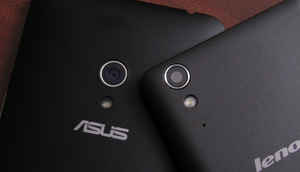
Build and Design
While the Lenovo A6000 carries a very good build and design for a budget device, the Zenfone 5 is still the better of the two. Simply from a looks point of view, we find the Zenfone 5 to be the better looking smartphone. That said, the A6000 is much lighter and smaller as compared to the Zenfone 5.

Display
To reiterate the point made in the last slide, even though both the phones have 5 inch 720p displays, the A6000 is much smaller than the Zenfone 5. The display on the Zenfone 5 though boasts Gorilla Glass, which gives it a much more premium feel along with better touch response. The A6000 has a particularly cheap display, which takes points away from the overall experience.

Zen UI vs Vibe UI
Both the Zen UI and Vibe UI are quite bloated, but we tend to go with Asus' take on the Android UI. Why? Because the bloatware on Asus' UI isn't as intrusive as the A6000. That said, on the 8GB variant of the device, you would rue these additions. The same is applicable to the Lenovo A6000 as well. Vibe UI is colourful, but that's about all that can be said about it.

Camera (Zenfone 5 on the right, A6000 on the left)
Both the phones have 8MP rear cameras, but the Asus phone seems to be dealing with indoor lighting better. In addition, even in normal outdoor lighting, the A6000 tends to subdue images a little. That said, the A6000's price more than makes up for its somewhat inferior camera and we had no complaints from it.
Note: The pictures aren't accurate representations of the original pictures. You can find original pictures taken by both devices in their respective review, which are linked in the intro slide.
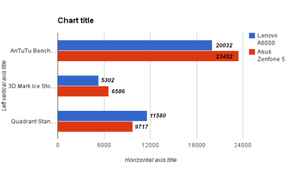
Performance
Asus' partnership with Intel for the Zenfone series paid off big for the OEM. The phone is one of the best performers in the budget, which is seen here. Of course, here also the A6000 more than makes up for the difference with its pricing.
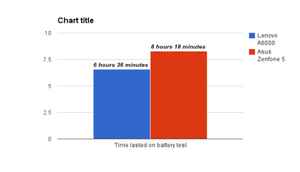
Battery
If we had to pick the weakest area for the A6000, it would be the battery. The phone doesn't match up to the Zenfone 5, lasting only about six and a half hours on our battery test, while the Zenfone goes above eight hours.
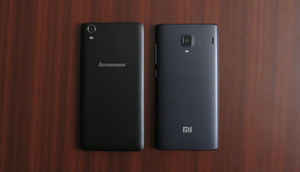
Lenovo A6000 vs Xiaomi Redmi 1S
Getting to the more serious competitors now, the Redmi 1S still costs Rs. 1,000 less than the A6000. That in itself is a redeeming fact in a market as competitive as today's. That said, let's take a look at how the A6000 matches up against the Redmi 1S.

Build and Design
Both these phones carry the traditional bar design, but the Lenovo A6000's design is the one we choose. Not only is the A6000 slimmer and lighter, it feels much more premium than the Redmi 1S. The choice you have to make is whether the Rs. 1000 you save with the Redmi 1S justifies this weakness.

Display
Both MiUI and Vibe UI have a way of making the displays seem better. Xiaomi's display though is the one we would pick. The presence of Dragontrail glass makes it practically scratchproof and it feels much better to use than the A6000. The viewing angles on the two are pretty much the same, as is the resolution (720p).

MiUI vs Vibe UI
When you think of UIs that OEMs provide today, MiUI is somewhat of a benchmark to measure others against. The customisation features on the UI are really useful and there's almost nothing that you'll say is a bloatware here.

Camera (Lenovo left, Xiaomi right)
As we wrote in the review, the Xiaomi Redmi 1S is still the best camera in the under 7k segment. This is because the A6000 tends to subdue images often, while the Redmi 1S takes brighter pictures. In indoor fluorescent lighting, the Redmi 1S shows somewhat better details than the A6000. The cameras are really close though and the difference will be hard to spot unless you have a trained eye and put the images side by side.
Note: The pictures aren't accurate representations of the original pictures. You can find original pictures taken by both devices in their respective review, which are linked in the intro slide.

Performance
The new Snapdragon 410 SoC is Qualcomm's budget 64-bit quad-core SoC and it is just ahead of the Snapdragon 400 on the Redmi 1S. The differences are easily visible on benchmarks.
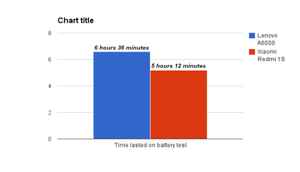
Battery
Even though the A6000's battery isn't the best, it's better than the Redmi 1S' battery. This is easily visible on our battery test. While the Redmi 1S never lasted us a whole day, the A6000 can just about get you through the day, but only just.

The Moto E has long been our favourite sub-7k smartphone, but it's time for it to relinquish its throne atop the mountain. While the Moto E remains a well balanced device and a good one to buy, now that the price has been dropped to Rs. 5,999, the A6000 is just newer and much more powerful in more than one way.

Display
While the Moto E's display still feels more premium than the A6000, the higher pixel density on the A6000 is hard to ignore. The viewing angles are also slightly better on the Lenovo device.

Build and Design
Let's face it, the Moto E was never a looker, so not much needs to be said on that front. The Lenovo A6000 is a runaway winner here, because of its slim and light form factor. In addition, the phone is just the right size too, while the Moto E may be considered to be too small by some.

Camera
When the Moto E was launched, it's only weakness was in the 5MP fixed focus camera on the back. Even in the innacurate representation here, you can easily fifure out that the A6000 is miles ahead of the Moto E. Well, it's about time Motorola refreshed its device range.
Note: The pictures aren't accurate representations of the original pictures. You can find original pictures taken by both devices in their respective review, which are linked in the intro slide.

Performance
Even on the performance front, the A6000 leaves the Moto E far behind, with not only higher benchmark scores, but also better real world performance.
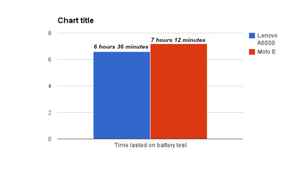
Battery
The Moto E still rules when it comes to the battery though, giving almost two extra hours on our battery test. The phone can last you more than a day, unlike the A6000, which will just about get you through the day if you're careful.

Conclusion
If you're considering any of these phones, you should note that the Lenovo A6000 holds a first mover's advantage. Lenovo is first to the market with a new generation phone, which makes it the best performer for the time being. That said, the graphs against the Redmi 1S and Zenfone 5 clearly show that it is not that far ahead, meaning phones like the Redmi 2 will be better than the A6000. What we can conclusively say is that the A6000 is a better choice than the Moto E.
You can buy the Lenovo A6000 if you need a phone in a hurry, but otherwise, we suggest waiting for Xiaomi and Motorola to refresh their product ranges. Also, the Zenfone 5 still seems like a much better option, even with the higher price, for those who have the budget.